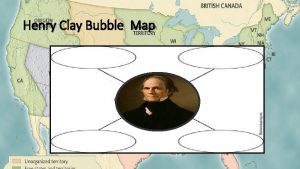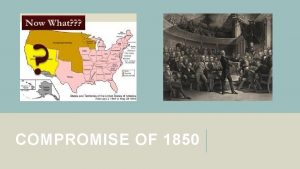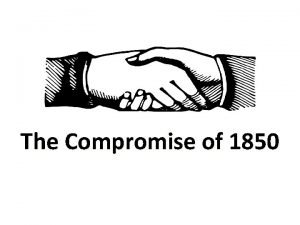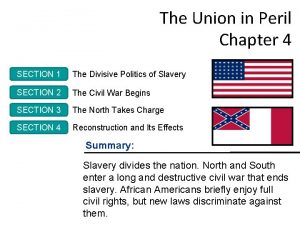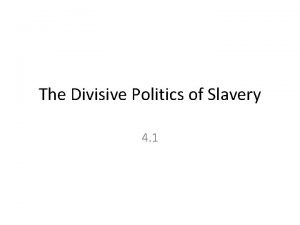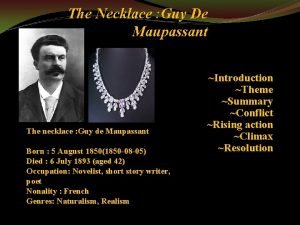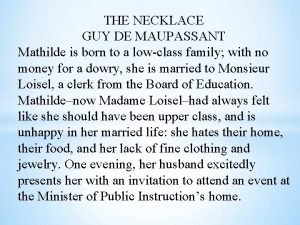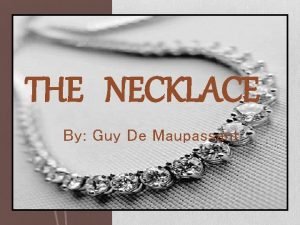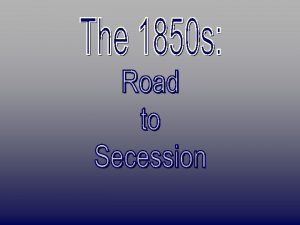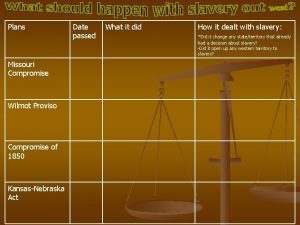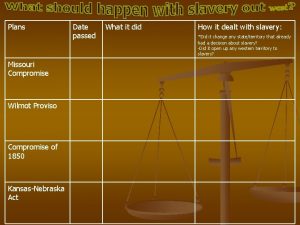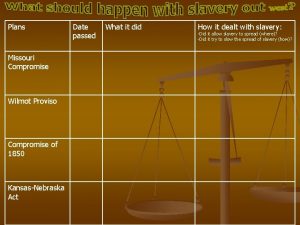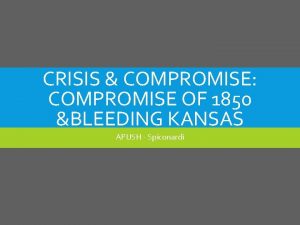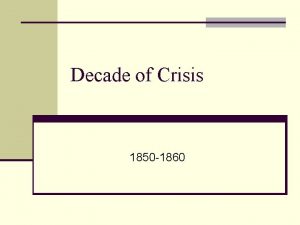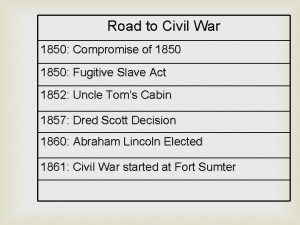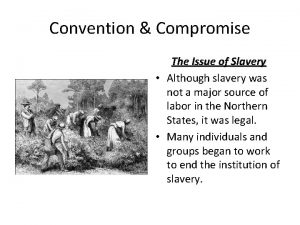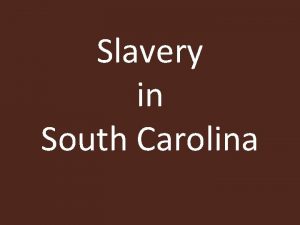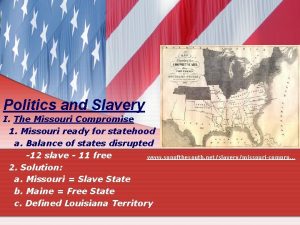COMPROMISE OF 1850 PLEASE FIND YOUR SLAVERY POLITICS
















- Slides: 16

COMPROMISE OF 1850

PLEASE FIND YOUR SLAVERY & POLITICS MAP

EXCERPT FROM THE MISSOURI COMPROMISE, 1820 SEC. 8. And be it further enacted. That in all that territory ceded by France to the United States, under the name of Louisiana, which lies north of thirty -six degrees and thirty minutes north latitude, not included within the limits of the state, contemplated by this act, slavery and involuntary servitude, otherwise than in the punishment of crimes, whereof the parties shall have been duly convicted, shall be, and is hereby, forever prohibited: Provided always, That any person escaping from slavery. . . may be lawfully reclaimed and conveyed back to the person (slave owner). . . According to the text, what happened to runaway slaves?

30 YEARS LATER, NEW ISSUE: NEW TERRITORY AFTER MEXICAN-AMERICAN WAR

WILMOT PROVISO By the standards of his day, David Wilmot could be considered a racist. He made a proposition that would divide the Congress. On August 8, 1846, Wilmot introduced legislation in the House that boldly declared, "neither slavery nor involuntary servitude shall ever exist" in lands won in the Mexican-American War. If he was not opposed to slavery, why would Wilmot propose such an action? Why would the north, which only contained a small, but growing minority, of abolitionists, agree?

FREE SOIL PARTY Salmon P. Chase, commemorated on the $10, 000 bill, founded the Free Soil Party in 1848. This party advocated an end to the spread of American slavery and elected 14 representatives and two senators to the federal government. The term "Slave Power" jumped off the lips of northern lawmakers when they angrily referred to their southern colleagues. It was time for northerners to be heard. Wilmot Proviso, although never passed as a law, The issue over slavery could no longer be avoided. Lawmakers in the House and Senate, north and south, would have to stand up and be counted.

WHAT TO DO?

THERE WERE SEVERAL POINTS AT ISSUE: 1. The United States had recently acquired a vast territory -- the result of its war with Mexico. Should the territory allow slavery, or should it be declared free? Or maybe the inhabitants should be allowed to choose for themselves? 2. California -- a territory that had grown tremendously with the gold rush of 1849, had recently petitioned Congress to enter the Union as a free state. Should this be allowed? Ever since the Missouri Compromise, the balance between slave states and free states had been maintained; any proposal that threatened this balance of free and slave states would almost certainly not win approval.

WHY WAS ADMITTING CALIFORNIA AS A FREE STATE A PROBLEM? 1. There was a dispute over land: Texas claimed that its territory extended all the way to Santa Fe. 2. Finally, there was Washington, D. C. Not only did the nation's capital allow slavery, it was home to the largest slave market in North America.

COMPROMISE TIME 1. New Mexico, Nevada, Arizona, and Utah would be organized without mention of slavery. (The decision would be made by the people who lived in the territory later, when they applied for statehood) Popular Sovereignty 2. Slave Trade would be abolished in Washington D. C (but slavery still allowed) 3. CA would be admitted as a free state 4. To pacify slave-state politicians, who would have objected to the imbalance created by adding another free state, the Fugitive Slave & Act was passed.


FUGITIVE SLAVE ACT The Fugitive Slave Law of 1850 made any Federal marshal or other officers of the law responsible for arresting in runaway slaves. Those who did not arrest an alleged runaway slave liable to a fine of $1, 000. Law-enforcement officials everywhere now had a duty to arrest anyone suspected of being a runaway slave on no more evidence than a slave owners sworn testimony that they owned the runaway. The suspected slave could not ask for a jury trial or testify on his or her own behalf. In addition, any person aiding a runaway slave by providing food or shelter was subject to six months' imprisonment and a $1, 000 fine. Officers who captured a fugitive slave were entitled to a bonus ($5) for their work. Since any suspected slave was not eligible for a trial this led to many free blacks being sent into slavery as they had no rights in court and could not defend themselves

DRED SCOTT DECISION, 1857 VIDEO

HARRIET TUBMAN & THE UNDERGROUND RAILROAD

• Most Famous “Conductor” of the Underground Railroad • After escaping herself, she made 19 separate trips back to the South and helped about 300 slaves escape to freedom She was called “Mama Moses” She served as a spy for the Union during the Civil War THE UNDER GROUND RAILROAD Secret network of abolitionist who worked together to help runaway slaves reach freedom in the North or in Canada Runaways would travel 10 -20 miles before they reached the next “station” which would be houses, barns, or cellars of white or free black people who chose to help them escape. They would be helped along the routes by people like H. Tubman – called conductors

EXIT TICKET: COMPROMISE OF 1850 1. What were the accomplishment of the Compromise of 1850? 2. Explain how popular sovereignty becomes an important issue regarding slavery following the Compromise of 1850. 3. Who created the Compromise of 1850? 4. What was significant of the Dred Scott Decision? 5. What were the dangers involved in the Underground Railroad?
 Explain the compromise of 1850
Explain the compromise of 1850 Who created the compromise of 1850? *
Who created the compromise of 1850? * Compromise of 1850
Compromise of 1850 Compromise of 1850
Compromise of 1850 Compromise of 1850
Compromise of 1850 Chapter 4 section 1 the divisive politics of slavery
Chapter 4 section 1 the divisive politics of slavery The divisive politics of slavery
The divisive politics of slavery Please be quiet. i (try) to sleep
Please be quiet. i (try) to sleep Kindly find below link
Kindly find below link Where was prussia in 1850
Where was prussia in 1850 The diamond necklace climax
The diamond necklace climax Madame loisel was born to a lower-class family.
Madame loisel was born to a lower-class family. The necklace by guy de maupassant plot
The necklace by guy de maupassant plot Adrien marie legendre
Adrien marie legendre Lei de terras 1850
Lei de terras 1850 Neoclassical
Neoclassical Se muestran resultados
Se muestran resultados
